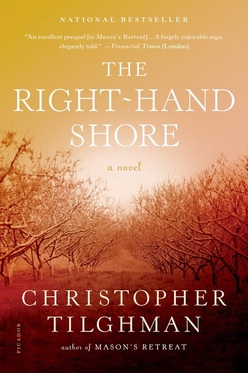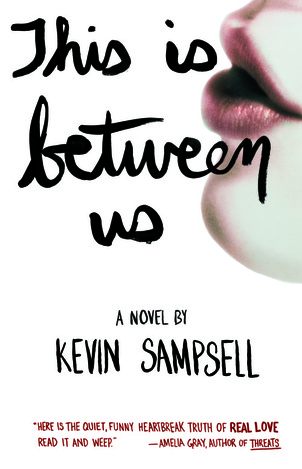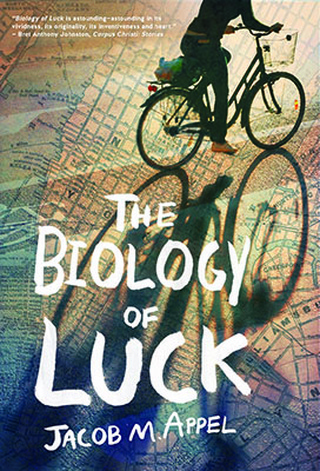Reviewed by Joe Kovacs

Mason is about as innocuous a surname as one can imagine. It’s not Usher or Compson which, drawn from the world of literature, call to mind cursed families where madness, cruelty, scandal and a fallible family bloodline result in dysfunction and destruction. But in the powerful yet tragic novel, The Right-hand Shore by Christopher Tilghman, it is the Mason family which has resided for hundreds of years on an estate on Maryland’s Eastern Shore that collapses time and again beneath the weight of history, slavery and race relations, and the foibles of human ambition.
I met the author a few months ago at the James River Writers Conference in Richmond where he was honored as a finalist for the Library of Virginia’s annual literary award in fiction. Over lunch, we fell into conversation about Maryland’s Eastern Shore. Mason’s Retreat—the infamous estate in Tilghman’s novel—is loosely based on his own family home. As a resident of Chevy Chase, Maryland, just outside Washington, DC, I have many times driven eastward down arrow-straight Route 50 to and through Annapolis, over the Bay Bridge and to the coast to spend long, relaxing weekends. Following my conversation with Tilghman, I reviewed a map of the Eastern Shore and noticed a Tilghman Creek branching off the Chester River. Still at the Richmond event, I did what any honorable writer’s conference attendee would do to support the community and purchased a book from an attending author. My decision, of course, was Tilghman’s The Right-Hand Shore.
I met the author a few months ago at the James River Writers Conference in Richmond where he was honored as a finalist for the Library of Virginia’s annual literary award in fiction. Over lunch, we fell into conversation about Maryland’s Eastern Shore. Mason’s Retreat—the infamous estate in Tilghman’s novel—is loosely based on his own family home. As a resident of Chevy Chase, Maryland, just outside Washington, DC, I have many times driven eastward down arrow-straight Route 50 to and through Annapolis, over the Bay Bridge and to the coast to spend long, relaxing weekends. Following my conversation with Tilghman, I reviewed a map of the Eastern Shore and noticed a Tilghman Creek branching off the Chester River. Still at the Richmond event, I did what any honorable writer’s conference attendee would do to support the community and purchased a book from an attending author. My decision, of course, was Tilghman’s The Right-Hand Shore.
It was the right choice.
Told over the period of approximately seven decades, from the years just prior to the Civil War to 1920, and tracing the stories of three generations of the Mason family, The Right-Hand Shore delves into the aftermath of slavery’s infamy and investigates the question of what is right and proper according to human nature. Ogle “Duke” Mason, the forebear of the novel’s descendants, finds that the number of slaves on the family estate is too expensive to keep. Recognizing that the North will soon emancipate these laborers, Duke eases his financial burden by selling his slaves to a purchaser from Virginia where, aside from Duke’s financial gain as a result of the sale, personal freedom seems a less likely prospect for his former “property.”
The horror of such cold commerce, which ends up breaking apart slave families long attached to Mason’s Retreat, sends Duke’s afflicted daughter, Ophelia, fleeing to Baltimore. Once she has come of age, Ophelia weds one Wyatt Bayly, who returns to the helm at Mason’s Retreat with an ambitious enterprise to remake the estate into a producer of peaches for sale across the region.
Told over the period of approximately seven decades, from the years just prior to the Civil War to 1920, and tracing the stories of three generations of the Mason family, The Right-Hand Shore delves into the aftermath of slavery’s infamy and investigates the question of what is right and proper according to human nature. Ogle “Duke” Mason, the forebear of the novel’s descendants, finds that the number of slaves on the family estate is too expensive to keep. Recognizing that the North will soon emancipate these laborers, Duke eases his financial burden by selling his slaves to a purchaser from Virginia where, aside from Duke’s financial gain as a result of the sale, personal freedom seems a less likely prospect for his former “property.”
The horror of such cold commerce, which ends up breaking apart slave families long attached to Mason’s Retreat, sends Duke’s afflicted daughter, Ophelia, fleeing to Baltimore. Once she has come of age, Ophelia weds one Wyatt Bayly, who returns to the helm at Mason’s Retreat with an ambitious enterprise to remake the estate into a producer of peaches for sale across the region.
| Ophelia and Wyatt’s son, Thomas, deepens the saga of relations across the races by developing strong friendships with Randall and Beal Terrell, the children of freed laborers from nearby Tuckertown. “The lamb should not lie down with the lion,” warns a house servant, a portent that re-emerges throughout the novel. Wyatt, who treats his laborers with civility, even to the point of pushing socially acceptable boundaries, encourages the intellectually gifted Randall to participate in private tutoring with his son. As the two boys grow, Thomas is clearly the lacking student, thus swaying the object of Wyatt’s affection. | |
The bulk of The Right-hand Shore occurs under Wyatt’s stewardship, and follows the arc of his ambitious commercial and social investments. All begins to disintegrate, however, once a blight of “the yellows” sweeps down from Delaware to destroy the thousands of peach trees he and the estate labor have toiled to plant and grow utilizing the practices of modern science. Thomas and Beal simultaneously develop an affection that breaches propriety and scandalizes the Masons, the Terrells and the swelling community of freed laborers attached to the estate.
The novel concludes once Mary Bayly, Wyatt’s daughter whom Ophelia has kept in Baltimore far from the Eastern Shore to be raised as a devout Catholic (and to atone, perhaps, for her father’s sins?), returns to the estate following a letter from her traumatized father. Ophelia recognizes Mary’s return likely means the end of her engagement to a promising suitor and the probability she will remain in thrall to the crushing force of the retreat on the family. Wyatt dies of disappointment, Randall is mysteriously murdered once his success at private tutoring leads him to a college education at Howard University in Washington, DC, and Thomas and Beal flee to France where their marriage will be looked upon with less social disfavor. Mary, hoping to remake Mason’s Retreat again, builds new dairy operations to rejuvenate the family home and fortune.
The Right-hand Shore has many protagonists, one of whom is Mr. French, who oversees estate operations under both Wyatt and Mary. His insight is as close to a summation of the Masons as any:
The novel concludes once Mary Bayly, Wyatt’s daughter whom Ophelia has kept in Baltimore far from the Eastern Shore to be raised as a devout Catholic (and to atone, perhaps, for her father’s sins?), returns to the estate following a letter from her traumatized father. Ophelia recognizes Mary’s return likely means the end of her engagement to a promising suitor and the probability she will remain in thrall to the crushing force of the retreat on the family. Wyatt dies of disappointment, Randall is mysteriously murdered once his success at private tutoring leads him to a college education at Howard University in Washington, DC, and Thomas and Beal flee to France where their marriage will be looked upon with less social disfavor. Mary, hoping to remake Mason’s Retreat again, builds new dairy operations to rejuvenate the family home and fortune.
The Right-hand Shore has many protagonists, one of whom is Mr. French, who oversees estate operations under both Wyatt and Mary. His insight is as close to a summation of the Masons as any:
“Later, when Mr. French reflected on this afternoon, he realized that out there in the realms of science and public policy, the tide had turned. Miss Mary, it was suddenly clear, had made a choice early on for all the right reasons, had taken the fundamental position that purity lay in nature, that it was technology’s purpose to preserve as much of that purity as could be done by fallible, fallen human beings. This was perhaps Mister Wyatt’s view…it was to be all their undoing. Science had now offered a new way of thinking in this golden age—that through human intervention, through science, man could achieve higher levels of perfection than the Creator Himself.”
Like her father before her, Mary invests in the latest science to deliver the best dairy products up and down the eastern seaboard. But, also like her father who faced a decimating blight to his orchards, she is undermined by the growing novelty of pasteurization that provides clean milk at more affordable prices to the masses. The Masons have long hoped technology and progressivism can augment crude human nature and bring a better livelihood to their family and society at large, and that the beginning of this new dawn of innovation can provide a kind of salvation.
Ultimately and consistently, their hopes are crushed. And Mary, having given up her engagement, fulfills her mother’s fears to become wed to the debilitating estate like other Masons before her. If one were to draw a conclusion from The Right-hand Shore, it may be that human nature in its purest, most unfettered form, is not to be intervened with, despite its fallibility. It is Thomas and Beal’s marriage in France—the moral opposite of Duke’s sale of slaves—that represents the best, truest success, cutting across racial hostilities and complications, and breaking the yoke of the Mason curse. Perhaps not coincidentally, they remain thousands of miles from Mason’s Retreat and its history of mercenary patrons, murder and failed ambition. Thomas frankly tells his older sister Mary that he will never return.
Written in an appropriate Victorian style of long expository passages and with naturalistic tendencies, The Right-hand Shore is well placed alongside Poe and Faulkner’s above-mentioned cursed families, as well as with contemporary novels that present powerful landscapes. David Guterson’s Pacific Northwest comes to mind. Intrigue abounds, house servants whisper, gossip, and tell secrets, and mysterious, sudden acts of violence shock. Tilghman has penned a worthy historical novel of Maryland’s Eastern Shore at the turn of the 20th century with, of course, yet one more Mason waiting in the wings at the story’s close. Tilghman’s previous novel, Mason’s Retreat, is intended as a kind of successor to The Right-hand Shore. While I have not had a chance to pick it up yet, I have no doubt I will soon enough.
Ultimately and consistently, their hopes are crushed. And Mary, having given up her engagement, fulfills her mother’s fears to become wed to the debilitating estate like other Masons before her. If one were to draw a conclusion from The Right-hand Shore, it may be that human nature in its purest, most unfettered form, is not to be intervened with, despite its fallibility. It is Thomas and Beal’s marriage in France—the moral opposite of Duke’s sale of slaves—that represents the best, truest success, cutting across racial hostilities and complications, and breaking the yoke of the Mason curse. Perhaps not coincidentally, they remain thousands of miles from Mason’s Retreat and its history of mercenary patrons, murder and failed ambition. Thomas frankly tells his older sister Mary that he will never return.
Written in an appropriate Victorian style of long expository passages and with naturalistic tendencies, The Right-hand Shore is well placed alongside Poe and Faulkner’s above-mentioned cursed families, as well as with contemporary novels that present powerful landscapes. David Guterson’s Pacific Northwest comes to mind. Intrigue abounds, house servants whisper, gossip, and tell secrets, and mysterious, sudden acts of violence shock. Tilghman has penned a worthy historical novel of Maryland’s Eastern Shore at the turn of the 20th century with, of course, yet one more Mason waiting in the wings at the story’s close. Tilghman’s previous novel, Mason’s Retreat, is intended as a kind of successor to The Right-hand Shore. While I have not had a chance to pick it up yet, I have no doubt I will soon enough.

Joe Kovacs is a writer of literary and horror fiction living in the Washington, DC metropolitan region. He authors a blog, The Write Place, about the intersection of life and writing.
Connect with the author of this review:
Twitter
Facebook
Google+
Connect with the author of this review:
Google+


 RSS Feed
RSS Feed

